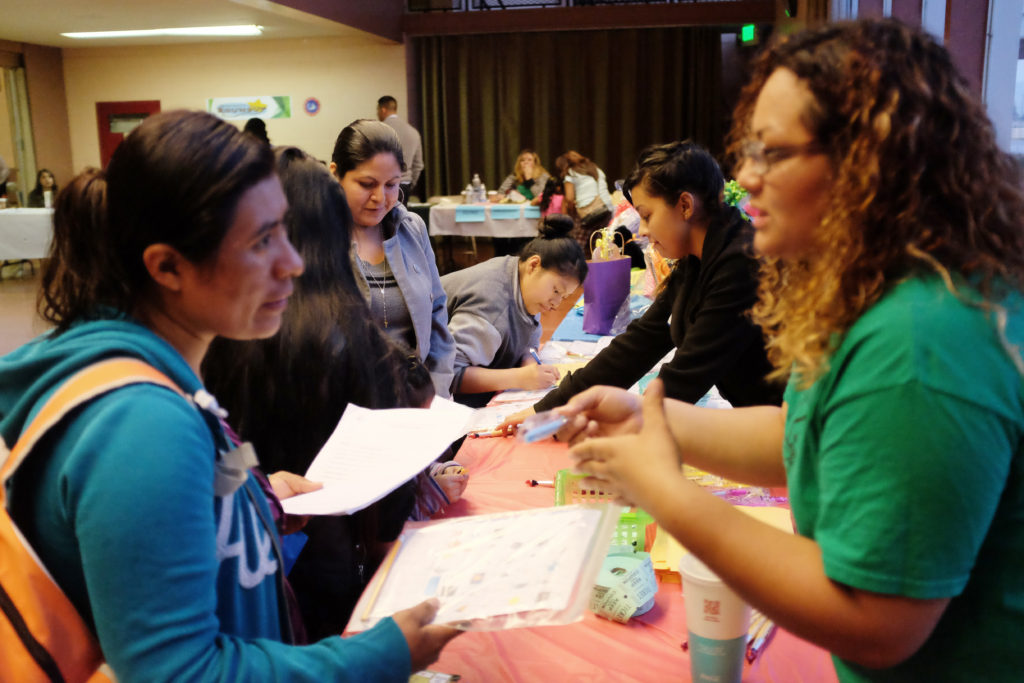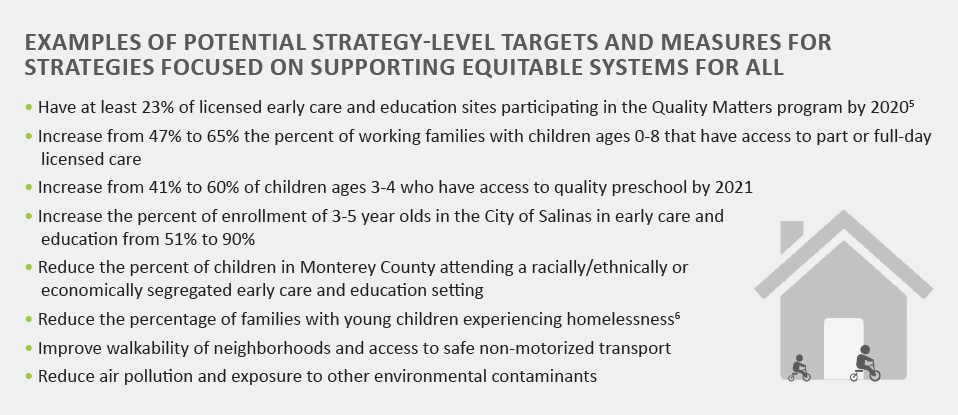 1. A COMPREHENSIVE, EQUITABLE SYSTEM THAT SUPPORTS ALL CHILDREN’S HOLISTIC DEVELOPMENT
1. A COMPREHENSIVE, EQUITABLE SYSTEM THAT SUPPORTS ALL CHILDREN’S HOLISTIC DEVELOPMENT
This key driver is about the systems that influence children and their families, including social norms, the built environment, and socio-economic and political systems. Our aim is to work towards a comprehensive, equitable system that better supports all children’s holistic development. In these systems, children are not segregated because of funding streams but flourish in diverse, high quality programs. Programs are based on the unique strengths of each family and community as well as the universal aspects of child rearing and development. Children are assessed in authentic ways and fair amounts, and success is defined in ways that meaningfully reflect lived-experience.
We want to change the mind-set that a child’s well-being is only the responsibility of individual families. Instead, we will work together to support a high-quality, comprehensive system where each child and their family have equitable access to appropriate services and supports that enable them to make choices and reach their unique potential.
While systems change is woven throughout this strategic framework, we will focus on two specific systems-shaping strategies aimed at supporting early childhood development, described here.
1.1 Transform early care and education systems to increase access and improve quality
This strategy will focus on licensed early care and education centers and family childcare, and will increase the percent of children enrolled in high quality early care and education. This approach involves systems change (changes in policies, regulations, resource flows, power dynamics, and mental models) to move from a complex fragmented system of early care and education, to a coherent system where all children receive equitable access to top quality care and education. Our systems-thinking approach involves addressing individual “gears” in the system, while also seeking to address the systems dynamics that are maintaining the current problems related to low quality, unaffordable care, and limited access. This requires shifting from a system where funding is at the center to a system where children’s well-being is at the center – and the true costs of low quality care are recognized and shared. In this system, early educators are valued and compensated at a level that reflects their vital role in shaping young minds – and thus contributing to the well-being not only of children, but of the entire economy and society at large (source). We will address stystemic inequities through supporting efforts to nurture resilience in children of color; nurturing empathy and inclusivity among all children; supporting caregivers to raise children who think critically about the why and how of patterns of racial inequity and other systemic forms of oppression; and support a justice advocacy movement for all children and adults.
This strategy will include specific projects to: expand the early care and education workforce; address facilities limitations with collaborative, pilot solutions; and develop universal preschool in the City of Salinas.
Click here to read more about the benefits of preschool.
1.2 Design coherent policies that improve the lives of children and families: Children First in all Policies
This strategy involves mainstreaming early childhood into other policy areas not typically considered – such as transport, land use, housing and economic development – and including early childhood language in general plans, master plans, and (re-)development plan policy documents at the city, county and state levels. It would ensure improved policy coherence and result in tangible improvements in the environment, as well as direct supports to families. The Advisory Group identified a particular need in Monterey County to focus on more coherent affordable housing and transport policies.
We will support the use of tools to transform public investments and policies, such as requiring a “Child Impact Assessment” (similar to Environmental Impact Assessment) which mandates staff/developers to examine potential positive and negative impacts of legislation, regulations, and new developments on young children and their families. It may also involve supporting sector-specific programs or policies with research, data analysis and policy recommendations, based on deepening partnerships between the Early Childhood Development Advisory Group and specific public departments/sectors. This strategy has many parallels to – and will complement – the Health Department’s Health in All Policies (HIAP) approach.

—
5 For a complete list of references and data sources please click here.
6 As defined by the McKinney-Vento Homeless Assistance Act. The term “homeless” means individuals who lack a fixed, regular, and adequate nighttime residence. It includes families sharing the housing of other persons, living in motels, hotels, trailer parks, or camping grounds; and migratory children.
